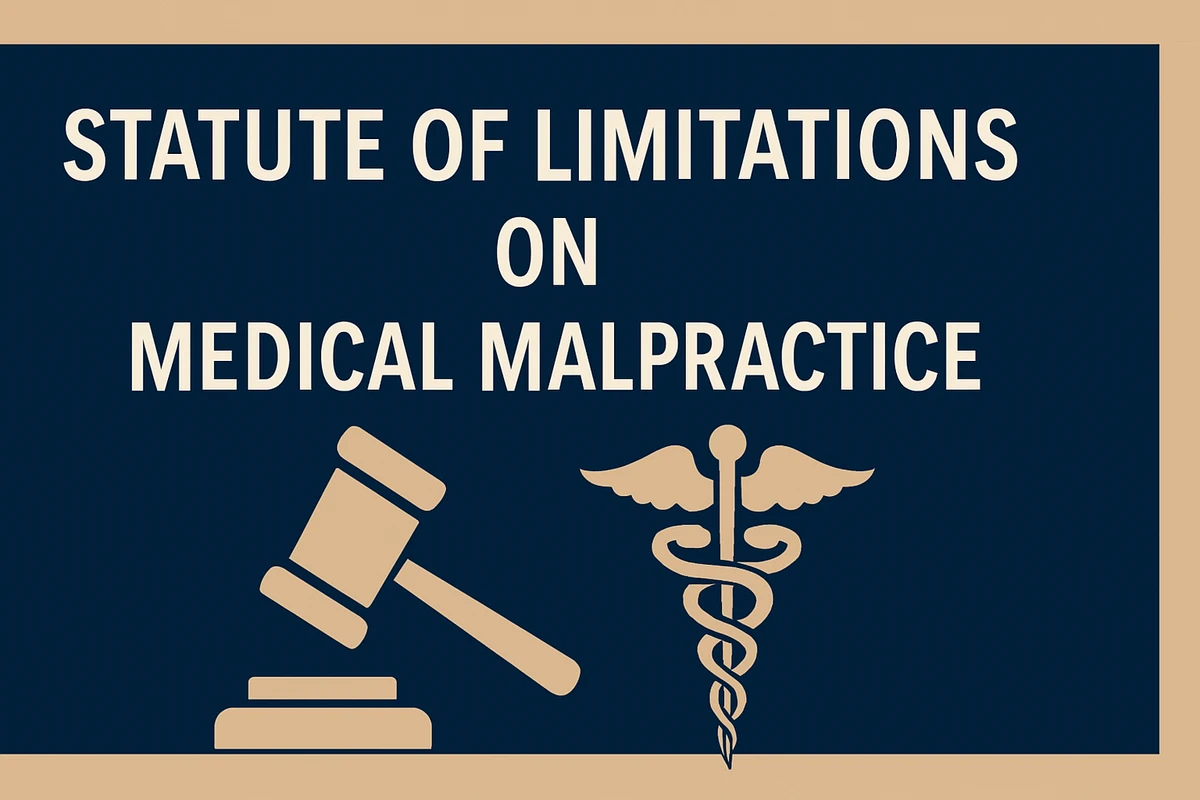Statute of Limitations on Medical Malpractice in Georgia: A Guide for Injury Victims

Published: 3/29/2025
When you’re dealing with the aftermath of a medical injury, the last thing you want is to be barred from seeking justice because too much time has passed. Georgia – like all states – sets time limits for filing medical malpractice lawsuits. These laws, known as statutes of limitations, tell you how long you have to take legal action. Missing the deadline can mean losing your right to compensation, no matter how strong your case might be
What Is a Statute of Limitations (and Why Does It Matter)?
A statute of limitations is essentially a legal countdown timer. It’s the window of time you have to file a lawsuit after an injury occurs. Once this window closes, you generally cannot file a case. These deadlines might seem unfair at first, but they exist for good reasons. Over time, evidence can be lost or degraded, and witnesses’ memories can fade
By requiring lawsuits to be filed within a certain period, the law aims to ensure fairness – cases are decided on fresh evidence and reliable testimony. It also provides certainty for healthcare providers, so they aren’t under threat of a lawsuit indefinitely. In short, the statute of limitations encourages anyone injured by malpractice to pursue their claim promptly, while everything is still relatively recent.
For injury victims, understanding this time limit is critical. If you file a lawsuit after the deadline, the court will likely dismiss your case without ever looking at the facts. Even if a doctor’s negligence is clear and your injuries are severe, you could lose the right to compensation simply because the clock ran out. Knowing the applicable timeframes can prevent this harsh outcome. In the following sections, we explain Georgia’s standard deadline for medical malpractice cases and the important exceptions that might give you more time (or sometimes less).
Georgia’s Standard Time Limit for Medical Malpractice Claims
In Georgia, the general statute of limitations for medical malpractice is two years. Specifically, state law says an action for medical malpractice must be brought “within two years after the date on which an injury or death arising from a negligent or wrongful act or omission occurred.”
In practical terms, that means you usually have two years from the date the malpractice happened or from when the injury caused by malpractice occurred to file your lawsuit. If the malpractice resulted in a patient’s death, the two-year period starts on the date of death (not the date of the medical error).
- For example, if a surgeon operated on January 1, 2025 and you were injured during that surgery, you would generally have until January 1, 2027 to file your claim. If a patient dies due to malpractice, the clock starts at the date of death – e.g., if a loved one passed away on June 1, 2025, a wrongful death medical malpractice suit would need to be filed by June 1, 2027.
This two-year window applies to most situations, ranging from surgical errors to misdiagnoses. It might sound like a long time, but preparing a medical malpractice case is complex and time-consuming. Medical records must be obtained and reviewed, experts consulted, and legal filings prepared. Attorneys often note that when a case is approaching even the six-month mark before the deadline, they must act quickly to investigate and file suit in time.Starting early is crucial – waiting too long can jeopardize your case.
The Statute of Repose: Georgia’s 5-Year Absolute Deadline
Georgia law doesn’t stop at the two-year limit. It also imposes a broader statute of repose of five years for medical malpractice cases. The statute of repose is essentially an absolute cutoff beyond the normal statute of limitations. According to Georgia’s statute, “in no event may an action for medical malpractice be brought more than five years after the date on which the negligent or wrongful act or omission occurred.” This five-year deadline runs from the date of the medical error itself, regardless of when the injury was discovered.
The statute of repose means that even if you discover your injury later, you cannot sue if more than five years have passed since the malpractice happened. In other words, it sets an outer limit on how long a malpractice case can “live,” no matter the circumstances. For example, imagine a surgeon made a careless mistake during a procedure on January 1, 2020, but you did not discover the resulting harm until January 2025 (five years later). Unfortunately, under Georgia’s statute of repose, it would likely be too late to file a lawsuit after January 1, 2025 – even though you only just learned of the problem. If the injury is discovered after five years have elapsed, the law bars any claim.
Think of the statute of repose as a final “back-stop” deadline. It works in tandem with the regular statute of limitations. In some cases, a patient might not know they were a victim of malpractice right away. Georgia’s law recognizes this by allowing the two-year clock to start when an injury is discovered (this is sometimes called a “discovery rule”). However, the five-year repose puts an upper limit on this: no matter what, you cannot bring a suit more than five years after the malpractice occurred (with only a couple of narrow exceptions discussed below).
- Suppose a doctor misdiagnosed you in 2019, but the consequences (your true condition worsened) only became apparent in 2022. In that scenario, you might still file a lawsuit in 2022 or 2023 because it’s within five years and you only recently discovered the injury. But if the misdiagnosis wasn’t discovered until 2025 (over five years later), Georgia’s statute of repose would likely prevent any recovery. This can feel harsh, but it reflects the legislature’s decision that after five years, even undiscovered malpractice claims must come to an end for the sake of certainty.
It’s important to note that the statute of repose is separate from the regular two-year limit. You must satisfy both. This means even if you discover an injury within five years, you still need to file within two years of discovery (if the injury “occurred” later) or within two years of the event – whichever is applicable. The repose just cuts off any possibility beyond five years. We’ll discuss a couple of key exceptions where the law gives a bit more leeway, effectively overriding the five-year repose in those special situations. Exceptions That Can Extend the Filing Deadline
Georgia’s medical malpractice time limits have a few built-in exceptions – special situations where the “clock” either starts later or is paused (tolled) for a period.
These exceptions are crucial for fairness in cases where a victim couldn’t reasonably meet the standard deadlines. Below, we detail the most important exceptions, including cases involving foreign objects left in the body and injuries to young children. We’ll also cover how fraudulent concealment by a doctor or other factors can toll (pause) the clock. Each of these rules has specific conditions, so it’s important to understand how they work.
Exception 1: Foreign Objects Left Inside a Patient
One of the most patient-friendly exceptions in Georgia is for cases where a surgeon or medical team left a foreign object in a patient’s body during a procedure. This is a sadly not-unheard-of form of malpractice – for example, a sponge or surgical instrument accidentally left inside after surgery. Such objects might not be discovered until long after the operation. Recognizing this, Georgia law says the normal limitations “shall not apply where a foreign object has been left in a patient’s body.” Instead, in those cases, you have one year from the date the object is discovered to file a lawsuit.
Crucially, this foreign object exception means that the usual two-year limit and the five-year repose don’t apply in this scenario. No matter how much time has passed since the surgery, the clock starts when you find the object. For example, if you had surgery in 2018 and a forgotten surgical sponge is finally detected via an X-ray in 2025, Georgia law gives you until 2026 to sue (one year from discovery) even though that’s well beyond the normal five-year cutoff. As long as you file within one year of discovering the object, your claim is valid.
However, note that not everything left behind counts as a “foreign object” under this rule. The law specifically excludes things like chemical compounds, fixation devices, or prosthetic aids from this definition. In other words, if your case involves a surgical screw or implant that was intentionally placed in your body (even if it later caused issues), that’s not a “foreign object” for purposes of this exception. The rule is really aimed at items that should have been removed but weren’t (sponges, clamps, gauze, etc.). If you suspect a foreign object was left inside you, it’s wise to act quickly once it’s discovered – that one-year clock starts ticking upon discovery, and it’s a hard deadline.
- Example: Jane has abdominal surgery in 2020. Three years later, in 2023, she experiences pain and infections. Doctors discover a surgical sponge was left in her abdomen. Even though it’s now been three years since the surgery, Jane can still file a malpractice lawsuit – but she must file within one year of discovering the sponge (by 2024).
The usual two-year limit from 2020 and the five-year repose (which would have expired in 2025) do not bar her, because Georgia’s law tolled the time limit until the discovery of the foreign object. If Jane waits more than a year after finding out, however, she would lose her right to sue. The takeaway: foreign object cases have a unique window that opens upon discovery but stays open for only one year.
Exception 2: Medical Malpractice Involving Minors (Children)
Another important exception involves injuries to minors. Young children cannot advocate for themselves, and their parents may not immediately realize an injury has occurred, especially in cases like birth injuries or pediatric malpractice that may take time to manifest. Georgia law accounts for this by adjusting the statute of limitations when the patient is a child under age 18. The rules here are a bit complex, but let’s break them down:
For children under 5 years old at the time of malpractice: The clock does not start running until the child’s 5th birthday. The law explicitly says that a minor who was under age 5 when injured has two years from their fifth birthday to bring a medical malpractice action.
For minors age 5 or older at the time of malpractice: They are treated more like adults for limitations purposes. A child who was already 5 (or a teenager) when the malpractice occurred is subject to the standard two-year limit (and five-year repose) in the same way an adult would be. In other words, turning 18 isn’t a trigger for the clock – the clock likely started at the time of injury, even though the victim is a minor. This is different from many other types of personal injury cases where minors get until age 18 plus the normal time; in Georgia medical malpractice, the law is stricter once the child is at least 5.
Statute of repose for minors
Georgia also extends the ultimate deadline for very young children. If the child was under 5 at the time of the malpractice, the law says no case can be brought after the child’s 10th birthday – that’s the statute of repose for minors.
Putting this together, Georgia law ensures that a child’s claim won’t expire in their tender early years. The statute of limitations is effectively paused until the child turns 5, and then they get the standard two years from that point. This is a form of tolling due to minority. But once a child is at least 5, the law expects the claim to be pursued within the normal timeframes (often by a parent or guardian on the child’s behalf). And regardless of age, no child’s malpractice case can extend beyond their tenth birthday if the injury happened before age 5.
In all cases, it’s wise for parents to act sooner rather than later. While the law gives extra time for young victims, evidence can fade and it can actually become harder to prove the case as years pass, so using the full extension is not always beneficial
Exception 3: Fraudulent Concealment by a Healthcare Provider
Sometimes a doctor or hospital might hide their wrongdoing or fail to disclose an error. For instance, a surgeon who knows something went wrong might not tell the patient, or medical records might be altered to cover up negligence. In Georgia, if a medical provider’s fraud or deception prevented you from discovering the malpractice, the law can toll (delay) the start of the statute of limitations until you discover the fraud. Georgia Code § 9-3-96 provides that when the defendant is guilty of fraud that deters the plaintiff from filing, the time limit is tolled until the patient discovers (or reasonably should have discovered) the fraud.
This is essentially a fraud-based extension of the filing deadline. It exists to prevent wrongdoers from benefiting if they actively mislead a patient. However, proving fraudulent concealment is not easy – it requires showing the provider intentionally deceived or withheld information in a way that prevented you from learning of the malpractice. Simple failure to mention an error might not qualify unless it can be deemed intentional concealment. If fraud is proven, the two-year clock will start when you uncover the truth. But keep in mind, even in cases of fraud, Georgia’s five-year repose might still apply as an outer limit in many situations (with the notable exception of the foreign object scenario discussed earlier, where repose doesn’t apply). So, if a doctor hid a mistake for eight years, a claim might still be barred after five years unless another exception (like the foreign object rule) applies. The bottom line is that fraud can pause the clock, but it’s not a blanket free pass – there are limits.
- Example: Dr. Smith accidentally administers the wrong medication to a patient, causing complications. Instead of informing the patient of the error, Dr. Smith alters the chart to hide it. The patient only learns of this cover-up three years later when another staff member comes forward. In this case, Georgia’s fraud tolling provision would likely apply – the statute of limitations would begin running when the patient discovered the deception, not from the date of the medication error. Thanks to the doctor’s concealment, the patient was “debarred or deterred” from filing earlier. The patient should file as soon as possible after discovery, because they’ll still need to navigate the statute of repose (depending on how much time has passed in total). Courts will scrutinize such claims carefully, so it’s advisable to have an attorney gather clear evidence of the fraud if you intend to rely on this exception.
Exception 4: Tolling for Incapacity
What if the injured patient is mentally incapacitated or legally incompetent? Under general Georgia law, statutes of limitations can toll during a person’s period of mental incapacity. However, Georgia’s medical malpractice statute has some special rules here. The law (O.C.G.A. § 9-3-73) states that persons who are mentally incompetent or disabled are subject to the same time limits as others once they’ve reached a certain age or stage
In Summary: Don’t Wait to Seek Guidance
Georgia’s statutes of limitations for medical malpractice are strict, but they are also filled with nuances. For most adults, you have two years to file a lawsuit over medical negligence, and absolutely no more than five years from the date of the malpractice. Special rules may give additional time in cases involving young children or foreign objects left in the body, and the law allows pauses for things like proven fraudulent concealment or delays in getting vital medical records. These provisions exist to make sure patients aren’t unfairly prevented from seeking justice when circumstances are beyond their control.
However, even with these extensions, the safest course is to act promptly. If you suspect you or a loved one has been harmed by medical malpractice, it’s important to speak with a qualified attorney as soon as possible. An attorney can help determine when the “clock” started in your specific case, which exceptions apply, and how much time remains to file. The rules can be complicated – for example, figuring out when an “injury occurred” in a misdiagnosis case, or proving that a hospital’s delay in handing over records should toll the deadline. Missing a deadline, even by a day, can end a case, no matter how deserving the claim may be.
On the other hand, meeting the deadline keeps the courthouse doors open for you. By acting within the allowed timeframe, you preserve your chance to obtain compensation for medical bills, lost income, pain and suffering, and other damages caused by malpractice. We understand that taking legal action can feel overwhelming when you’re also dealing with the physical and emotional fallout of an injury. But Georgia’s time limits make it something you can’t put off indefinitely. Being informed about these laws is the first step. With knowledge of the statute of limitations and its exceptions, you can make sure your rights are protected while you focus on healing. In this way, the law aims to strike a balance: giving victims a fair opportunity to seek justice, but also encouraging timely action so that claims can be resolved while evidence is fresh. If you have any doubt about how these rules apply to your situation, reach out for legal help – a supportive professional can clarify your deadlines and guide you through the next steps, ensuring that you don’t lose your chance to hold the negligent party accountable.
Remember, time is of the essence in medical malpractice cases. By understanding Georgia’s statute of limitations and acting within the legal timeframes, you give yourself the best shot at justice and recovery.
Related Articles



